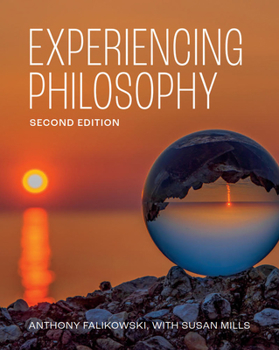Experiencing Philosophy - Second Edition
Select Format
Select Condition 
Book Overview
Experiencing Philosophybegins with the assumption that philosophy is not merely something you know but also something you experience and participate in. The book presents philosophical theories and ideas with reference to their practical relevance to the lives of student readers. To this end, a number of engaging features and inserts are provided: * Original Sources: Numerous primary readings are included, introducing students directly to the philosophical work of diverse thinkers ranging from Plato to Martin Luther King Jr. Each reading is thoughtfully excerpted and followed by reflective questions. * Philosopher Profiles: Abstract ideas are connected to the lives of real historical figures through fascinating biographical profiles. * Take It Personally: To illustrate how philosophy can be useful and relevant, each chapter begins by placing the material in a personal context. * Know Thyself Diagnostics: This book takes seriously--as did Socrates--the Delphic Oracle's dictum to know thyself. Students are given self-diagnostics to explore their own philosophical values, ideals, and beliefs. * Philosophers in Action: Philosophy is something you do, not just something you know. Prompts are provided throughout the text inviting students to conduct thought experiments, analyze concepts, and discuss and debate controversial points. * Thinking about Your Thinking: These metacognitive prompts require students to engage in higher-order thinking, not only about the presented readings and ideas but also with respect to their own values, assumptions, and beliefs. * Plus: Built-in study guides, diagrams, famous philosophical quotations, comics, feature boxes, and more!
Format:Paperback
Language:English
ISBN:1554815258
ISBN13:9781554815258
Release Date:January 2023
Publisher:Broadview Press Inc
Length:568 Pages
Weight:0.05 lbs.
Dimensions:1.1" x 7.9" x 9.9"
Customer Reviews
1 rating
good text with innovative presentation
Published by Thriftbooks.com User , 21 years ago
This excellent book is one of the best introductory philosophy textbooks I have ever reviewed.The book has technically correct,nuanced positions and an ample supply of primary source excerpts.The author also provides a unique emphasis on the contemporary practical relevance of philosophy.Having resumed my teaching career after a long absence,I have found recently that students generally have a much less extensive background in humanities,history,and literature than in years past.Students come to us (in the philosophy profession) with very few,if any,reference points with regard to future philosophy studies.It has become much harder to teach 100 level courses exclusively from primary source material.Furthermore,it has become harder to "sell" the value of philosophy to beginning students.The author writes in an engaging style and "makes the case" that philosophy is intrinsically valuable.The professor no longer needs to strategize in terms of justifying the course.With the increasing emphasis in university teaching on multiculturalism and cultural diversity,the author provides substantial coverage of Native North American,Asian, and feminist perspectives.The author supplies the student with several study guides,progress checks,and goal questions based on the SQ3R method of learning.The book is supported by a companion website.If I would have to mention one minor criticism,the author does certain things that I tell the students not to do in formal papers:refer to oneself as "I",refer to the reader as "you",use contractions,and address the reader using imperative statements and/or rhetorical questions.I understand why this might be done in an introductory text,but I am thinking it might be hard to tell the students not to do certain things that the textbook author himself does.Other than that one issue,I found the book to be a wonderful read.I definitely plan to use this book as the major text in a future INTRODUCTION TO PHILOSOPHY class.





